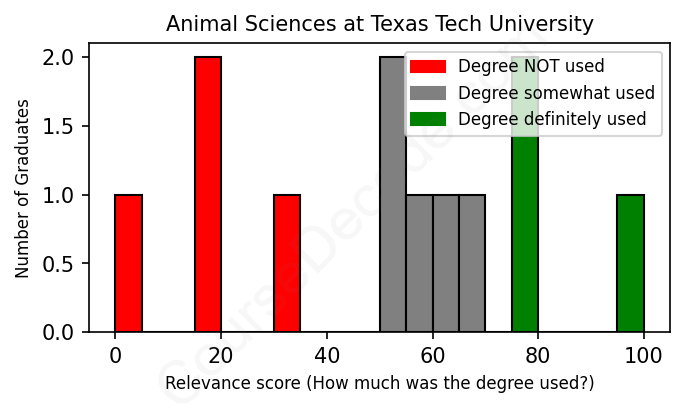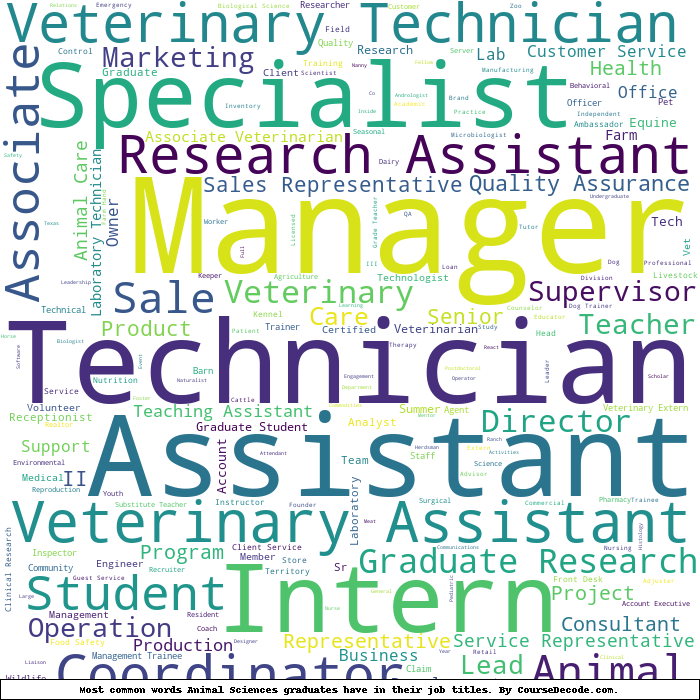
First, some facts. Of the Animal Sciences graduates from Texas Tech University we've analyzed , here's how many have used (or NOT used) their degree in their career:

These are estimates based on AI analysis of 12 LinkedIn profiles (see below).
The verdict? Significantly below average. Overall, with an average relevance score of 51%, Animal Sciences graduates from Texas Tech University have a much lower likelihood (-16%) of finding work in this field compared to the average graduate across all fields:
And for comparison, here's the chart for all profiles we've looked at across all degrees.
Also, after graduating, 50% of these graduates have pursued further education other than another Bachelor's degree (such as a Masters degree or other), compared to the average across all profiles of 35%. This suggests you may need more than just a Bachelors degree to be competitive as a Animal Sciences graduate.
See the details:
|
Relevance score: 33% We think this person has NOT gone into a career related to their degree. We think this person has NOT gone into a career related to their degree.
DEGREE INFOGraduated in 2011 from Texas Tech University with a Bachelor's degree in Animal Sciences. Also pursued further education since (see below). JOB HISTORY SINCE GRADUATIONVeterinary Technician Lubbock Small Animal Emergency Clinic May 2014 - Sep 2018 Nurse Tech  Covenant Health Feb 2018 - Sep 2018 Intensive Care Nurse  Covenant Health Sep 2018 - Jul 2023 ECMO Specialist  Covenant Health Oct 2020 - Jul 2023 Relief Charge Nurse  Covenant Health Feb 2022 - Jul 2023 FURTHER DEGREES DONE SINCE GRADUATINGMaster of Science (M.S.)Texas Tech University 2012 - 2014 RN Covenant School of Nursing and Allied Health 2017 - 2018 BSN Lubbock Christian University 2018 - 2019 Doctor of Nurse Anesthesia Practice Texas Christian University 2023 - 2025 ABOUTStrong community and social services professional, graduate of Covenant School of Nursing with an RN diploma degree, a BSN from Lubbock Christian University and CCRN certification. Experience in Medical ICU as well as adult and pediatric ECMO. Currently attending TCU's CRNA program class of '25. Skilled in Research, Nursing, Life Sciences, and Scientific Writing. |
The top 10 most common jobs done by the graduates we've analyzed (ranked most common to least) are:
Looking at the job profiles of folks who graduated with a degree in Animal Sciences from Texas Tech University, it seems a lot of them have ended up in roles that are either related to animal care or heavily based in human health and management. The most common and relevant jobs are definitely Veterinary Technicians and positions related to animal husbandry, like Herd Managers and Feedlot Coordinators, which directly use the knowledge gained during their studies. It's clear that those who leaned towards veterinary and animal management roles are much more aligned with their degree, utilizing their skills and expertise on a daily basis.
On the flip side, many graduates have ventured into jobs that don't really tie back to Animal Sciences. Positions like Substitute Teacher, various nursing roles, and sales jobs in unrelated fields lack direct application of their specialized knowledge. Even roles in quality assurance and some management positions may involve a bit of animal science here and there, but they aren’t primarily focused on it. Overall, while there are solid career paths that are relevant to their degree, a notable number of graduates seem to have drifted into areas where their education in Animal Sciences isn’t front and center.
Here is a visual representation of the most common words in job titles for Animal Sciences graduates (this is across all Animal Sciences graduates we've analyzed, not just those who went to Texas Tech University):

When looking at the career paths of graduates from Texas Tech University with a degree in Animal Sciences, it seems like there is quite a variety in their trajectories. Many of them start off in roles that are at least somewhat connected to animal care or health, like veterinary technicians or assistant roles at animal hospitals. However, it's noticeable that some first jobs appear to stray quite a bit from Animal Sciences, with roles in teaching, quality assurance in food industries, or even sales. This suggests that while some graduates find their niche in directly working with animals or in veterinary settings, others might pivot towards different fields early on, possibly due to job availability or personal interest shifts.
Looking five to ten years down the road, several graduates appear to have settled into solid careers that are related to their studies, particularly those that have remained in veterinary or agricultural fields. Positions like directors of food safety, aquatic manager roles, and nursing in animal health facilities show that a number of graduates have carved out successful paths. On the flip side, others seem to have moved away significantly from their Animal Sciences degree, taking on roles like loan administrators or event coordinators, which may not directly utilize their specialized knowledge. Overall, while some graduates are thriving in relevant careers, there’s also a number who appear to be in entirely different fields, which might make some wonder about the direct applicability of their degree in the job market.
Getting a Bachelor’s degree in Animal Sciences, like the one at Texas Tech University, can be a bit challenging but totally manageable if you're passionate about animals and science. You’ll dive into subjects like biology, nutrition, and livestock management, which can get pretty technical, especially if math or chemistry isn’t your strong suit. There’s a fair amount of hands-on work, too, so you'll need to be ready for labs and possibly working directly with animals, which is super cool if you love that stuff. Overall, it’s on the tougher side compared to some other majors, but if you stay organized and keep your interest alive, you can definitely handle it!
Most commonly, in the LinkedIn profiles we've looked at, it takes people 4 years to finish a Bachelor degree in Animal Sciences.
So, looking at these Animal Sciences graduates from Texas Tech University, it seems like they've landed a pretty mixed bag of jobs when it comes to earnings. Some, like the Intensive Care Nurse and the Quality Assurance Manager, are likely making decent money, considering the responsibilities that come with those roles. Others, like the Substitute Teacher or Home Health Aide, tend to have lower salaries, especially if they’re in part-time or interim positions. Overall, while some grads from this program appear to be doing well financially, especially those in healthcare and management roles, others might be struggling a bit, especially at the beginning of their careers or in less lucrative fields. It’s a game of luck and timing, you know?
Here is a visual representation of the most common words seen in the "about" section of LinkedIn profiles who have a Bachelor degree in Animal Sciences (this is across all Animal Sciences graduates we've analyzed, not just those who went to Texas Tech University). This may or may not be useful:

Here are all colleges offering a Bachelor degree in Animal Sciences (ordered by the average relevance score of their Animal Sciences graduates, best to worst) where we have analyzed at least 10 of their graduates:
| College | Score | Count |
|---|---|---|
 Purdue University Purdue University
|
80 | 14 |
 California State Polytechnic University-Pomona California State Polytechnic University-Pomona
|
78 | 13 |
 North Carolina State University North Carolina State University
|
77 | 18 |
 Iowa State University Iowa State University
|
75 | 25 |
 University of Missouri-Columbia University of Missouri-Columbia
|
75 | 12 |
 South Dakota State University South Dakota State University
|
73 | 10 |
 The Ohio State University The Ohio State University
|
71 | 21 |
 University of Florida University of Florida
|
68 | 15 |
 University of Vermont University of Vermont
|
68 | 12 |
 Michigan State University Michigan State University
|
67 | 20 |
 University of California, Davis University of California, Davis
|
66 | 27 |
 University of Illinois at Urbana-Champaign University of Illinois at Urbana-Champaign
|
63 | 16 |
 University of Tennessee, Knoxville University of Tennessee, Knoxville
|
61 | 13 |
 University of Arkansas University of Arkansas
|
60 | 10 |
 California Polytechnic State University-San Luis Obispo California Polytechnic State University-San Luis Obispo
|
59 | 22 |
 University of Wisconsin-River Falls University of Wisconsin-River Falls
|
58 | 10 |
 Texas A&M University Texas A&M University
|
54 | 34 |
 Penn State University Penn State University
|
53 | 14 |
 Texas Tech University Texas Tech University
|
51 | 12 |
 Kansas State University Kansas State University
|
51 | 22 |
 Oklahoma State University Oklahoma State University
|
43 | 16 |